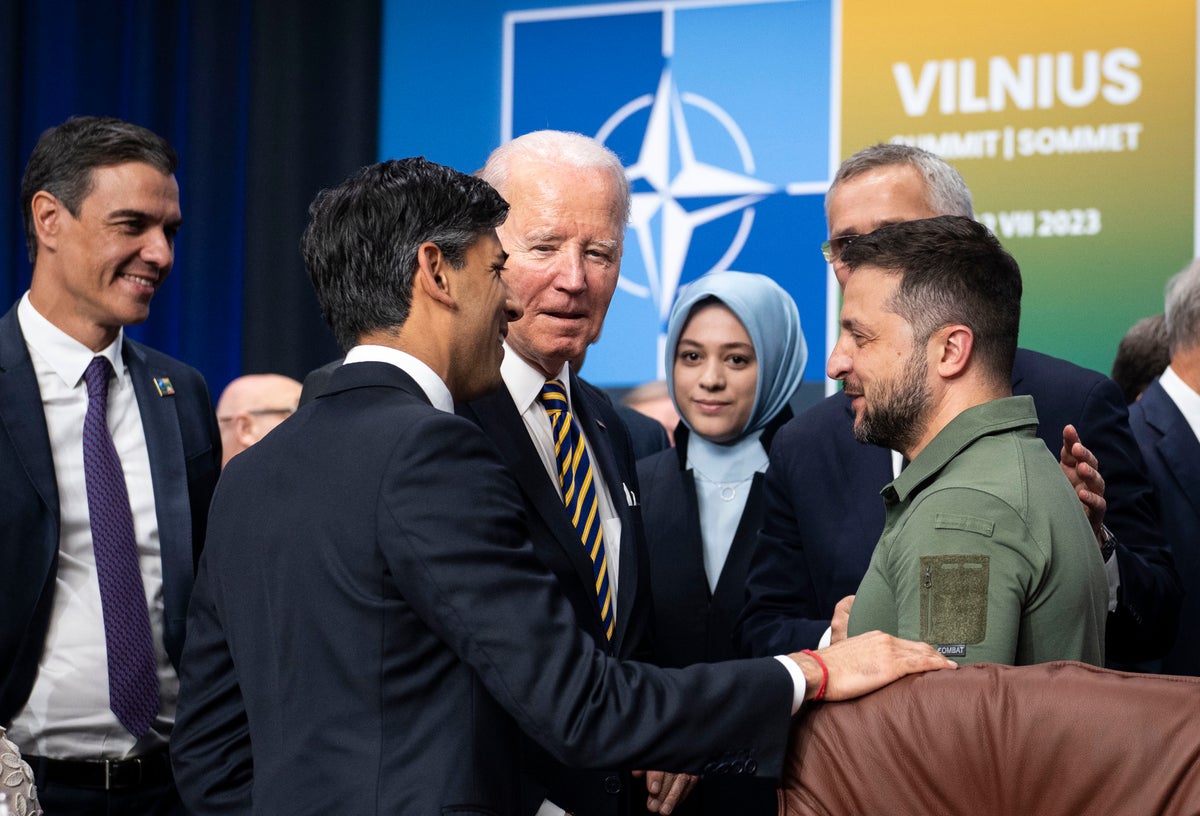
President Joe Biden on Wednesday said the joint declaration of support for Ukraine issued by the Group of Seven countries will “make it clear” that support for Kyiv from the world’s largest democracies “will last long into the future”.
Speaking at the Nato summit in Vilnius following the inaugural meeting of the Nato-Ukraine council, Mr Biden said the Western nations are making long-term commitments to Ukrainian security assistance while Ukraine continues a process that will lead to full membership in the soon-to-be 31-member bloc.
“This starts a process by which each of our nations and any other nation who wishes to participate will negotiate long-term bilateral or security commitments with him to Ukraine. We're going to help Ukraine build a strong capable defence across land, air and sea ... which will enforce stability in the region and deter against any and all threats,” he said.
Mr Biden reiterated the same sentiment a short time later during a bilateral meeting with Ukrainian president Volodymyr Zelensky.
He praised Mr Zelensky, the actor-turned-politician who has served as Ukraine’s leader since 2019, as having “done an enormous job” and promised that the US and its allies would “make sure that you get what you need”.
“And I look forward to the day when we’re having the meetings celebrating your official membership in Nato, so thank you for what you’re doing,” he said.
For his part, Mr Zelensky thanked the US president for his recent decision to provide Kyiv with cluster munitions for use against Russian troops on Ukrainian soil, telling Mr Biden that the move “will help us to save us”.
The announcement of the joint declaration and the meeting between Mr Biden and Mr Zelensky came after days of tension between the Ukrainian leader and his other Western counterparts over Ukraine’s prospects for membership in Nato.
While the US and many other Nato nations had been skittish about giving Ukraine a path to rapid membership while the war with Russia continues, other states have pushed for an immediate change in Kyiv’s status.
But the joint declaration — and an announcement from Nato that Ukraine could skip the Membership Action Plan previously laid out for the country’s membership bid and join at a future date post-war — appeared to smooth over the tension between the allies and the Ukrainian leader. Asked how long it would take for Nato to accept Ukraine once the war was over, Mr Biden quipped: “An hour and 20 minutes”.
A copy of the joint declaration obtained by The Independent states that the G7 leaders “reaffirm our unwavering commitment to the strategic objective of a free, independent, democratic, and sovereign Ukraine, within its internationally recognized borders, capable of defending itself and deterring future aggression”.
The leaders also affirmed that Ukraine’s security “is integral to the security of the Euro-Atlantic region” and condemned Russia’s “illegal and unprovoked” war as “a threat to international peace and security, a flagrant violation of international law, including the UN Charter, and incompatible with our security interests”.
“We will stand with Ukraine as it defends itself against Russian aggression, for as long as it takes. We stand united in our enduring support for Ukraine, rooted in our shared democratic values and interests, above all, respect for the UN Charter and the principles of territorial integrity and sovereignty,” they said.
The joint declaration further states that each of the Group of Seven countries will launch negotiations for bilateral security agreements to formalise “enduring support to Ukraine as it defends its sovereignty and territorial integrity, rebuilds its economy, protects its citizens, and pursues integration into the Euro-Atlantic community”.
Specifically, the G7 countries will each act to ensure that Ukraine can field “a sustainable force” that is both capable of defending the country now and deterring Russia going forward, using continued provisions of security assistance, support for the development of a Ukrainian defence industrial base, training, sharing of intelligence, and support for cyber defence and other initiatives.
The leaders also said that should Russia commence further attacks in the future, they would “immediately consult” with Kyiv to “determine appropriate next steps” and provide Ukraine with “swift and sustained security assistance, modern military equipment across land, sea and air domains, and economic assistance, to impose economic and other costs on Russia, and to consult with Ukraine on its needs as it exercises its right of self-defence enshrined in Article 51 of the UN Charter”.
“To this end, we will work with Ukraine on an enhanced package of security commitments and arrangements in case of future aggression to enable Ukraine to defend its territory and sovereignty,” they said.







